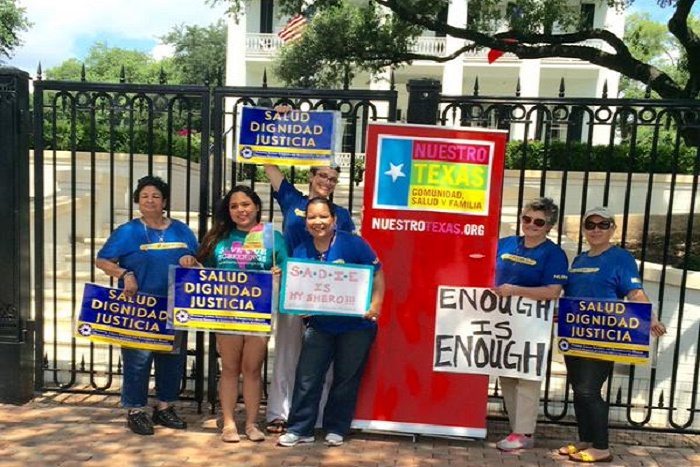‘People’s Veto’ Emerges as Texas GOP Slashes Cancer Screenings
Reproductive rights supporters have braved the crushing heat to join one dedicated 20-year-old Texan in her public call for Gov. Greg Abbott to reject lawmakers' decision to cut Planned Parenthood out of the state's Breast and Cervical Cancer Screenings program.

Reproductive rights supporters have braved the crushing heat to join one especially dedicated 20-year-old Texan in her public call for Republican Gov. Greg Abbott to reject lawmakers’ decision to cut Planned Parenthood out of the state’s Breast and Cervical Cancer Screenings (BCCS) program.
Sadie Hernandez is calling her daily action the “people’s veto.”
Hernandez, who grew up in the Rio Grande Valley, has set up a festive day-camp on the sidewalk outside the Texas governor’s mansion, just across the street from the towering state capitol in downtown Austin. Since June 4, the Planned Parenthood volunteer and reproductive rights activist has been spending 12 hours a day—when she’s not running to work her shifts at a nearby cafe—tearing it up on social media and on the ground by tweeting, posting selfies, and actively protesting a state budgetary move that she says left her “shocked and horrified.”
Community meeting! Share your thoughts! 💖💙💖💙 pic.twitter.com/DfNgZxp0Jk
— Sadie (@sadieeehdz) June 13, 2015
The gist: anti-choice Texas lawmakers, in their continuing crusade against Planned Parenthood, approved a budget item this year that bans the provider from participating in a reproductive cancer screening program for low-income Texans. Planned Parenthood had previously seen about 10 percent of the program’s enrollees, but the state’s GOP-majority legislature changed the eligibility for the program to only include clinics and doctors authorized to participate in the Texas Women’s Health Program (TWHP).
That’s the very program that state bureaucrats had to build from scratch in 2013 after lawmakers ousted Planned Parenthood from a federally funded Medicaid program, violating the Social Security Act and losing federal matching dollars for low-income Texans who need contraceptives and cancer screenings. Abbott has until June 21 to sign off on the biennial budget, and Hernandez has pledged to stay at her camp outside the governor’s home until the day he puts pen to paper; she’s calling for a line-item veto on the BCCS ban.
Hernandez is beating the heat with a shady tent and coolers full of cold water and snacks, and local musicians and spoken word performers have come out to help pass the time. Dozens of friends and fellow activists have joined Hernandez—including Texas icon Wendy Davis, the former state senator who for 13 hours filibustered the state’s omnibus anti-choice law in 2013. Her Brownsville-based family made the six-hour drive up to Austin during the first week of her protest to stand in solidarity with Hernandez, or perhaps, as she might say on Twitter, to #standwithsadie during the #peoplesveto.
When you meet a queen 💙💖💙💖 @WendyDavisTexas pic.twitter.com/CChCIAJln6
— Sadie (@sadieeehdz) June 10, 2015
Davis’ visit was a huge hit with the “people’s veto” camp, as have been appearances from Abbott’s puppy, Pancake, who makes occasional visits at the front gate to sniff and play with protesters. Hernandez is inspiring new activists too, including her sister’s boyfriend’s mom, Enedelia Varela, who woke at 2 a.m. the Sunday before last to road trip to Austin with her kids to support Sadie, and to protest in remembrance of Varela’s sister, Laura, who died from breast cancer in November.
“I needed to be here in remembrance of her,” said Varela, resting in a rare shady spot as noon approached on Tuesday.
Varela told Rewire that she has another personal investment in the protest: Her doctors recently found a lesion in her breast. When Varela looked for affordable treatment options at local clinics—just two in her area offer affordable care—she was given two- and three-month wait times for an initial visit.
“I had to have that on hold,” she said, patting her chest. But then Hernandez told Varela about Planned Parenthood, which could offer affordable care much sooner than government-funded clinics, thanks to its specialty focus and higher capacity.
Now that the provider’s participation in the BCCS program is in limbo, though, Varela could once again be in a jam.
“It’s great that they have this program,” said Varela, “but your options are so limited.”
Last weekend, she asked her colleagues to cover her shifts at a local nursing home—Varela is a licensed vocational nurse, but doesn’t have health insurance—and made the trip north to Austin. On the fourth day of the “people’s veto,” Varela helped Hernandez deliver a petition of 15,000 signatures supporting Planned Parenthood’s continued participation in the BCCS program to the governor’s office.
“It was an awesome feeling,” Varela said. “I felt empowered to be able to represent all those 15,000 people.”
When she gets back home, Varela said she’s making a call to Planned Parenthood—right after she goes back to work. She can’t afford not to.
“It’s like, am I going to work to pay my medical bills, or work to support my family?” Varela asked, as her 8-year-old reappeared from his spot down the sidewalk where he’d been holding a protest sign. Varela stood up from her camp chair to stretch and take his place.
“OK,” she said. “Now it’s my turn.”
